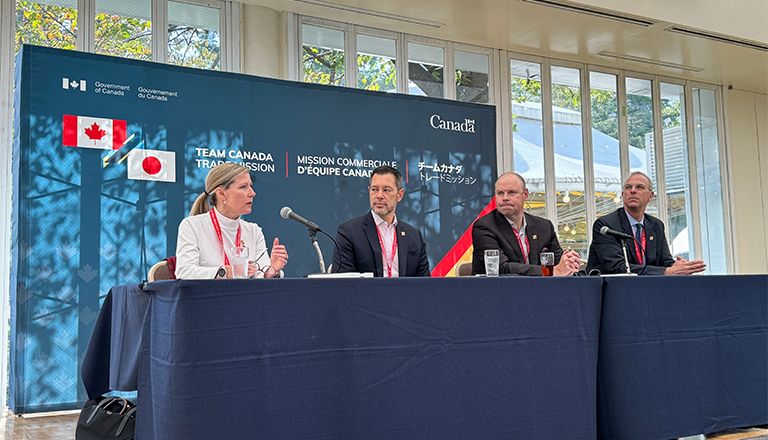
How joining a trade mission can accelerate your export plans
Author details
Susan Redding
Senior international trade writer
In this article:
Market diversification is a priority for companies that want to reduce risk and increase opportunities for growth. With a world of opportunity to explore, the trick is to find a market where your business can thrive.
For example, the fast-growing Indo-Pacific region holds immense potential for Canadian exporters. Careful market research, including in-person visits to scope out opportunities, is a must. But taking your first step into this vast and diverse region of four billion people, spread across 40 markets, can be daunting.
Joining a Team Canada Trade Mission can make it easier to find your footing and forge a path to success in your target market. Even if you’re beginning your export journey in a market closer to home, like the United States (U.S.), a trade mission can fast-track your company’s market entry and prepare you for further diversification down the road.
This article explores four compelling reasons why you should consider going on a trade mission, explains how you can apply for upcoming Canadian trade missions to the Indo-Pacific, and provides additional resources for researching and joining trade missions and trade events in other markets.

What is a trade mission?
A trade mission is a delegation of business people and government officials who visit another country to explore business opportunities, build relationships, and foster trade partnerships. Trade missions often involve a few days of intensive meet-and-greets and matchmaking, along with presentations and discussions aimed at promoting exports and investments between the host nation and the visiting delegation.
Team Canada Trade Missions are led by the Minister of International Trade or other senior government officials, with support from the Trade Commissioner Service (TCS), Export Development Canada (EDC) and the Canadian Commercial Corporation (CCC).
These missions prioritize innovation sectors and seek to open doors for export-ready Canadian companies of all sizes, including small- and medium-sized enterprises (SMEs) led by groups traditionally underrepresented in trade. They include women, Indigenous Peoples, Black and other racialized Canadians, the 2SLGBTQI+ community and youth.
The TCS and many provincial, territorial and industry groups also organize trade missions, often targeted by industry or sector, to other global markets. They offer Canadian businesses unique opportunities to make connections in the target market, build networks, gain valuable market intelligence, and access government support.
4 reasons to join a Team Canada Trade Mission
1. Get introduced to trustworthy partners
As a trade mission delegate, you’ll be introduced to reputable local companies by Canada’s knowledgeable and experienced team of trade experts. These introductory meetings are a critical first step in any market and can be especially helpful in the Indo-Pacific, where the business environment is highly relationship-driven.
It takes time—and good connections—to establish your credibility and gain trust with a prospect or partner in a new market. Language differences and a lack of familiarity with local customs and business etiquette are often barriers for new entrants. Women and entrepreneurs from groups traditionally underrepresented in trade may face additional hurdles in markets where business is still male-dominated.
Visiting as part of a trade mission simplifies the introduction process immensely. You get to meet potential clients, partners and distributors in meetings facilitated by Canada’s trusted Trade Commissioner Service, which can open doors for your business.
Tabitha Osler experienced it firsthand when she joined the Team Canada Trade Mission to Japan in 2023. Osler is the founder and CEO of fairechild, a sustainable fashion brand that manufactures outerwear from recycled plastic bottles.
“I think the most valuable activities from (the trade mission) have been the B2B meetings, specifically when I was able to meet the store from Japan that I’ve been wanting to meet with and do business with for several years,” Osler says of her experiences in Japan.
The face-to-face interactions you have on a trade mission enable you to start building the trust and interpersonal relationships essential for doing business in a new region. You’ll no longer be a stranger in markets where personal connections count.
2. Raise your profile and gain support
Team Canada Trade Missions showcase the best of Canadian capabilities and competitiveness in markets of opportunity for Canadian companies. Applicants go through a competitive screening process, so being selected for a mission adds prestige to your company’s reputation. Appearing at trade mission events alongside government officials further enhances your credibility and trustworthiness in the market and raises your company’s profile with prospective clients and partners.
“Being vetted and getting introduced as a business under the Canada umbrella, I think that’s a huge benefit for any kind of partnership that you want to start,” says Nancy Wingham, co-CEO of Nuez Acres, the Indigenous-owned, sustainable beauty company she co-founded with her husband, Anthony Wingham.
Nuez Acres has joined trade missions to China and the U.S. to explore export opportunities for their unique, pecan-oil skincare products. They’ve come away with new connections in these markets and numerous practical insights they’re using to refine their international expansion plans.
The busy entrepreneurs also learned that the benefits of a trade mission begin before you leave Canada and continue long after you return home. “There’s a lot of support from the TCS for pre-trade mission preparation to help you get ready for the meetings, like feedback on your capability statements, your pitch deck, things like that,” says Anthony.
Besides prospects in the market, trade missions introduce you to helpful representatives from the TCS, EDC, CCC and other government agencies that can provide ongoing support with specialized trade resources, practical advice and market knowledge that can significantly enhance your export plans.
“Having that relationship with the trade commissioner has been huge for us. Just being able to email them with questions and have somebody with the knowledge in other countries support us is a big help. We’re launching our products on an online platform in Hong Kong (HKTV Mall), and that was done with support from the trade commissioner,” says Nancy.

3. Enjoy next-level networking opportunities
Trade missions are a great platform for knowledge-sharing and networking with industry experts and peers. During these missions, you can attend exclusive networking events, seminars and workshops where you can learn from experienced professionals and gain insights into best practices for exporting to your target market. Plus, you get many opportunities for casual interactions with other Canadian companies on the mission, which can open doors for potential partnerships and collaborations at home and abroad.
Bringing together talented business people creates a high-intensity environment that fosters knowledge-sharing. You leave the trade mission with a whole new network of contacts who can help you grow your business. As Osler explains, “Being a part of a delegation this huge, with 300 other people and businesses, I’ve been able to make connections with people in the Creative Export Canada program and other industries. But more important was meeting our Japanese stockists in person and finding new stockists we can export to.”
4. Develop firsthand market intelligence and business insights
Every market is unique, with distinct economic trends, regulations and consumer preferences. Regional differences within some countries, especially large markets, can be significant. The Indo-Pacific is especially diverse, and what works in one market may not be effective in another. Strong market intelligence is crucial to understand the nuances of your target market, so trade missions are designed to immerse you in the local business environment.
A typical trade mission program includes briefings by trade commissioners, roundtable discussions with industry representatives, and site visits. You’ll come away empowered with firsthand knowledge to shape your business strategy and enable better decision-making about your export plans.
In short, joining a trade mission can be a game-changer for Canadian companies looking to accelerate their growth in the Indo-Pacific and other global markets. With access to key markets, government support, networking opportunities, and valuable market intelligence, these missions offer a unique opportunity to get to know your target market, streamline the market entry process and set your company up for success with exporting.
You should also check out
Expand your understanding of how and where to diversify your markets to avoid overdependence and ensure future growth.
FAQs about joining a trade mission
How can I apply for a trade mission?
Visit the Trade Commissioner Service website for information about upcoming trade missions, including dates, locations, target sectors, and application deadlines. Bookmark the page and check back frequently, as new trade missions are announced regularly.
How much does it cost to attend?
There’s no fee to join a trade mission. But you’ll be expected to cover your own travel costs, including airfare, accommodations, ground transportation and meals not included in the program.
Can I get financial assistance to go on a trade mission?
The CanExport program provides up to $50,000 to small- and medium-size enterprises (SMEs) for international business development activities, including international travel expenses for trade missions. The program is competitive and the funds available each year are limited, so it’s important to apply early.
You can also use the Business Benefits Finder to find additional government programs to support your international growth, and subscribe to CanadaExport for news and tips from the TCS.
What should I do to get ready for a trade mission?
Osler recommends doing your homework beforehand to ensure you make the most of your meetings on the trade mission. Preparation, in the form of market research, is key, she says.
“Once you land, it’s very busy. You’re always on the go, so make sure you’ve lined up meetings with all the businesses that you want to meet with ahead of time. The trade mission itself facilitates space to have those meetings and provides interpreters, so use that to your advantage and understand the market before you come.”
The Winghams leveraged Canada’s Trade Accelerator Program (TAP), designed to help SMEs develop their international business strategy and make connections. The couple also participated in trade missions to enrich their market knowledge. As a result of their experiences, they refined their export strategy and were more selective about the trade missions they joined, ensuring they were a good fit for their business.
“We make sure that the mission that we’re going on isn’t just a generic one, and really making sure that the people we meet with are interested in seeing us,” says Anthony. The entrepreneurs also recommend being well-prepared for your meetings during the trade mission, and booking time with the companies you most want to meet.
















